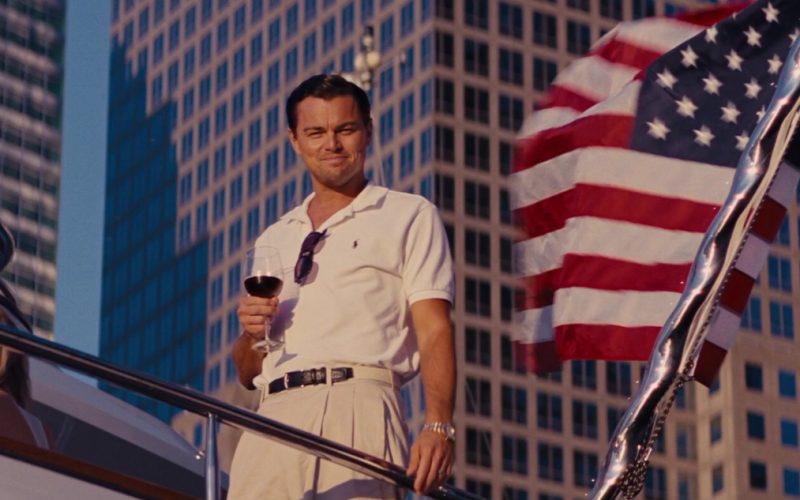The Wolf Of Wall Street (2013).
At the time of its release a lot was written about Martin Scorsese’s most successful film The Wolf of Wall Street. Much of it about the record number of words beginning with the letter F, others about the amount of sex on screen. I think it is fair to sum much of the film’s narrative content up in one word – debauchery.
Just like the wolf in the nursery rhyme about pigs with various amounts of engineering prowess and variable life spans, this film is about a wolf with an appetite which seemingly cannot be quenched. In the children’s rhyme the wolf eats one pig after another without ever getting full. In Scorsese’s film the wolf, played with an abundance of physical energy by Leonardo DiCaprio, has an appetite that knows no end. He drinks, snorts and fondles with impunity. Too much is never enough, it’s just the appetiser. The film is so full of hedonism and excess that it bursts at its seams even at almost 3 hours in length. Apparently there’s a 4 hour cut out there somewhere which promises much more.
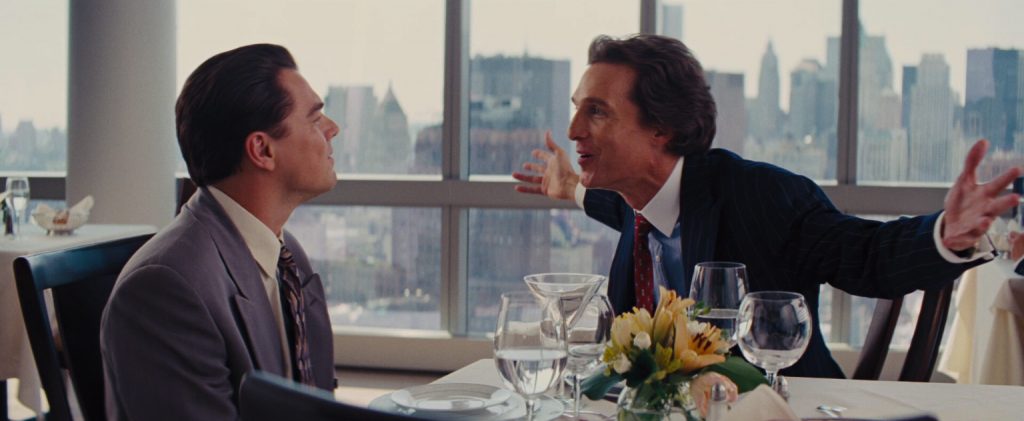
The story charts the rise of Jordan Belfort, a young man trying to make it in Wall Street. Initially his dreams of wealth are hindered by an economic downturn which sees him lose his job on the very day he gets his broker’s license. But he’s determined and spots an opportunity selling penny stocks, a dark and barely regulated corner of the banking sector. Whereas most brokers of these stocks are the dregs of the industry, Jordan has an obvious knack for the job. In other words he’s a confident liar.
As his success rises, his ambitions grow and any semblance of decency diminishes. The more he has, the more he wants, and this also includes women. Although he is married to Ann, as soon as he sees the beautiful Naomi (Margot Robbie), he must have her. He starts to believe that money and possessions are everything and at one point even tries to bribe Patrick Denham (Kyle Chandler), the FBI agent who is actively investigating him. Belfort drinks, smokes, and gets high without ever thinking of the consequences, believing that nothing can touch him. Money gives him power and a sense of invulnerability which is fed by the constant supply of drugs.
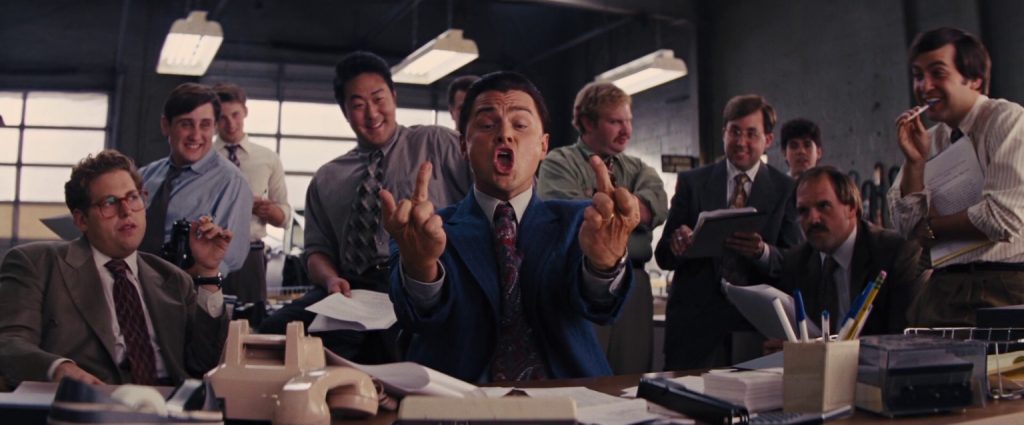
Perhaps the funniest scene occurs after Belfort and his best friend and partner Donnie Azoff (Jonah Hill) take out-of-date drugs. When they don’t get the immediate high they want, they take more. Still nothing happens. Belfort is then called out of his house to make a phone call (he suspects his house is bugged) and, at the local country club whilst on the phone, the drugs finally kick in. What follows is proof that DiCaprio is a fantastic physical comic. He drags himself to the car and later believes he drove home carefully and without any issues, until the police knock the door the next morning to reveal his beautiful Lamborghini Countach has been totalled.
Of course Belfort isn’t the only one, and this is one of the points the movie tries to make. His friends, all minor criminals, embrace the world of dodgy financial dealings as mere extensions of their criminal pasts. All they need is a push in the wrong direction, something Belfort is more than willing to help them with. And it goes beyond just a small band of debaucherous renegades – when Forbes writes up a biting article revealing Belfort’s insidious sales techniques and blatant criminality, instead of being his ruin, he attracts the attention of half of Wall Street, all of whom suddenly want to work for him.
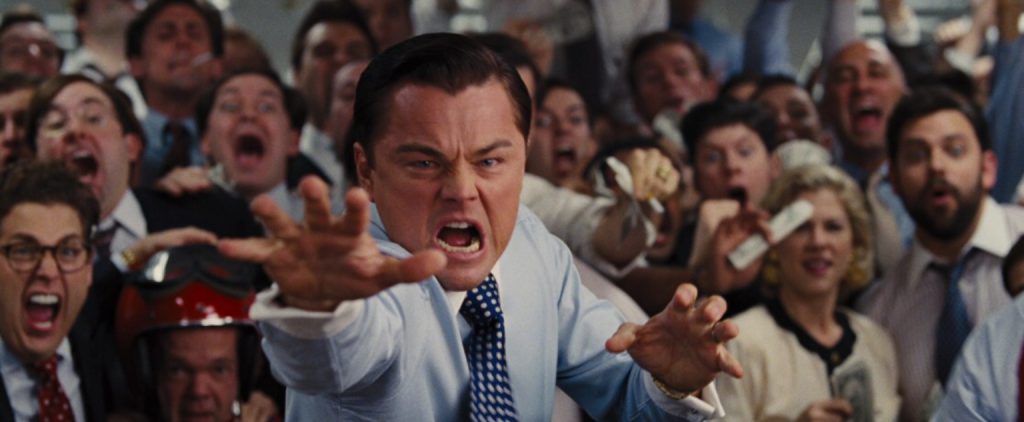
The Wolf of Wall Street has divided opinion. Whilst IMBD users rate the film a very respectable 8.2/10 some critics have said it is too much. Mark Kermode said he didn’t like the main character, Jordan Belfort, and so the film was difficult to enjoy. Others have said that it glorifies the excessive lifestyle of this kind of Stockbroker and fails to show the effects that such mis-selling has on ordinary people. This is especially fertile ground at the moment as the world totters on the edge of another possible global recession but I think these criticisms miss the point to some degree.
Yes, Jordan Belfort is a reprehensible scumbag. He made his millions preying on people just like the wolf of the rhyme prayed on the three little piggies. The difference being that Belfort would never have wasted his time trying to blow down the brick house when there are plenty of piggies living in straw and wood huts eager to get rich quick without taking the time to truly protect themselves against the wolves.

We aren’t meant to like Belfort, and despite a commonly levelled criticism of this film, neither are we to sympathise with him. Instead Belfort is meant to be a comical character, someone to laugh at, not with. His overindulgence of drugs and his distaste for anyone who really works for a living merely points the finger of ridicule at him. We know he’s deplorable pond scum (as his new boss aptly describes him on the first day of his new job). He is completely unlikable and the film-makers know this. We see his excesses, not to lure us into his world and have the rug pulled from under us as Scorsese did with Goodfellas, but to make Belfort the butt of the joke. The film-makers clearly want the audience to be in on that joke, Belfort doesn’t realise this which makes his mishaps funnier.
Mark Kermode’s criticism seems to suggest that there must be a relationship between the audience and the protagonist. There has to be something on-screen which makes the viewer want to know more about the main character. Do we really need to like the person we are watching? Did anyone really like Jake LaMotta? Of course not, yet Raging Bull is a truly great film.
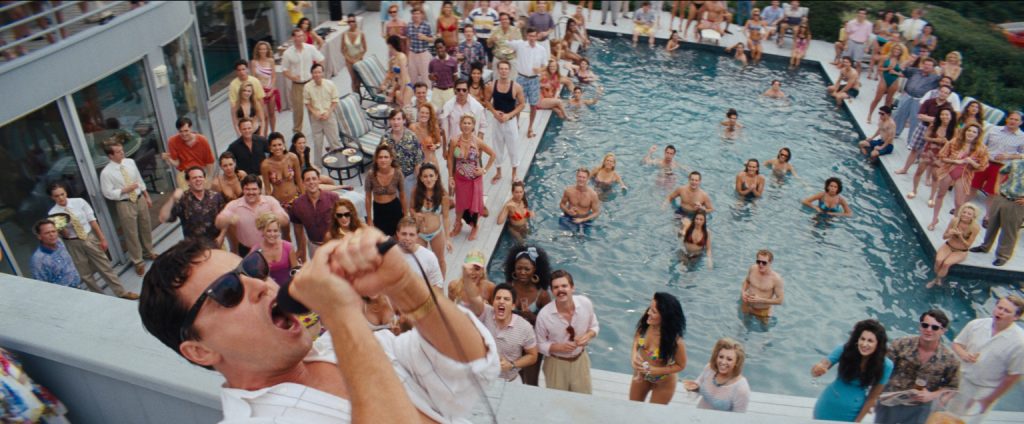
I have a theory that the reason that so many of us are willing to condemn the poor (especially if they are claiming public money), but give the super-rich a free pass is because none of us wants to be poor but we all want to be rich. We all want to have so much money we can have beautiful houses and fancy cars. Are we so willing to play our complicit part in forgiving the bankers who made so many lives miserable because ultimately, we want to have what they have? The genius of The Wolf of Wall Street is that it points a finger at the super-rich and says “This is who you are forgiving! These are the people you are letting off the hook!”
Some may look at this film and think ‘this is what I want out of life.’ Just like the job applicants in the film who are inspired by the Forbes article, there are always people out there who don’t fully understand the message the film is trying to convey. If you want to see a perfect example of this, check out Donald Trump’s video in which he discusses why Citizen Kane is his favourite film. To Trump, Charles Foster Kane is someone to emulate, not pity. He saw the success and not the flaws. Some see this misreading as the fault of the film but this is not the case.

The Wolf Of Wall Street is a daring and highly entertaining film which ends on a rather poignant note. The last two scenes illustrate that, whilst Belfort is the butt of the joke, ultimately the real joke is on us. Belfort has found a new path – not one of sobriety but one which allows him to tell his life story and inspire people to be more like him. He travels the world teaching people how to sell, how to project confidence and how to make money. This is contrasted with Agent Patrick Denham, who sitting on the underground train, understands that as long as the Jordan Belforts of the world exist, it’s the common man or woman, the hard-working schmo, who is being laughed at, and there are thousands more Belforts out there who will do anything to be in on the joke.
Film ‘89 Verdict – 8/10

